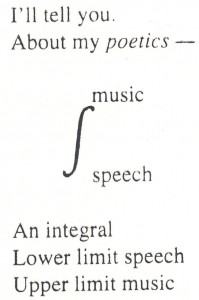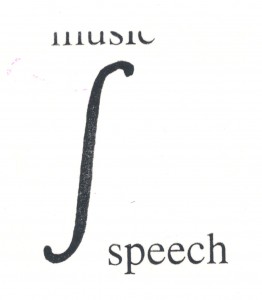Archive for the ‘Louis Zukofsky’ Category
Entry 808 — Grumman Us&Them, No. 314
Monday, July 23rd, 2012
Recently I quoted a passage of Louis Zukofsky’s “A” here. I then started an Internet search for background material on Zukofsky and came across the following (beautifully-written) notice posted by Paul, Louis’s son:
|
|||||||
| from Paul Zukofsky
TO WHOM IT MAY CONCERN Far too many people, especially perhaps-innocent grad. students, have been misled into thinking that, in terms of quoting LZ or CZ, they may do what they want, and do not have to worry about me. These people are then suddenly faced with the reality of an irascible, recalcitrant MOI, and are confronted with the very real prospect of years of work potentially down the tubes. I therefore wish to post an obvious “do not trespass” sign where LZ aficionados may see it. All Louis and Celia Zukofsky is still copyright, and will remain so for many many years. I own all of these copyrights, and they are my property, and I insist upon deriving income from that property. For those of you convinced that LZ would find my stance abhorrent, the truth is that he kept all copyrights (initially in his name) as he had the rather absurd idea that said copyrights would be sufficient to allow for the economic survival of my mother, and their son. My stance is congruent with that hope. Despite what you may have been told, you may not use LZ’s words as you see fit, as if you owned them, while you hide behind the rubric of “fair use”. “Fair use” is a very-broadly defined doctrine, of which I take a very narrow interpretation, and I expect my views to be respected. We can therefore either more or less amicably work out the fees that I demand; you can remove all quotation; or we can turn the matter over to lawyers, this last solution being the worst of the three, but one which I will use if I need to enforce my rights. In general, as a matter of principle, and for your own well-being, I urge you to not work on Louis Zukofsky, and prefer that you do not. Working on LZ will be far more trouble than it is worth. You will be far more appreciated working on some author whose copyright holder(s) will actually cherish you, and/or your work. I do not, and no one should work under those conditions. However, if you have no choice in the matter, here are the procedures that I insist upon, and what you must do if you wish to spare yourself as much grief as possible. 1– people who want to do their dissertation on LZ, or want to quote from him in their diss., must, if only as a common courtesy, inform me of their desire to use this material, and obtain my permission to do so. If you do that, and if I agree, the permission will be only for the purposes of the diss. and there will be no charge for limited use within the diss. You will not be allowed to distribute the diss. publicly. Distribution via on-line publication is not allowed. I urge you to keep quotation to a minimum, as the more quotation, the less likely I am to grant permission. 2– people who quote Louis Zukofsky in their dissertations without having had the courtesy to request my permission, and who do so without having obtained my permission to quote LZ, do not have permission to use LZ quotations, and will, in the future, be refused all permission to quote any and all LZ in their future publications, and I promise to do my utmost to hamper, hinder, and preferably prevent all such quotation. 3– people who obtain copies of LZ manuscripts, marginalia, etc. etc. such as at UTexas or elsewhere, and who have not first requested and received my permission to have such copies made, will thereafter be refused permission to use any such materials in any of their future publications. Note that fair use is far more restrictive on unpublished material than on already published material. 4– people who wish to perform LZ or CZ (“A-24”; the “Masque” etc) require performance rights from me. A fee will be charged. People who wish to set LZ to music also require permission to do so. 5– I forbid so-called electronic “publication”. People may not quote LZ in their “blogs”. 6– if you proceed to the point of publishing articles in journals, books etc, or if you publish a book, you must obtain my permission to quote, and fees will be charged. Once again I urge you to quote as little as possible. That will minimize your cost. Final points. I can perhaps understand your misguided interest in literature, music, art, etc. I would be suspicious of your interest in Louis Zukofsky, but might eventually accept it. I can applaud your desire to obtain a job, any job, although why in your chosen so-called profession is quite beyond me; but one line you may not cross i.e. never never ever tell me that your work is to be valued by me because it promotes my father. Doing that will earn my life-long permanent enmity. Your self-interest(s) I may understand, perhaps even agree with; but beyond that, in the words of e.e.cummings quoting Olaf: “there is some s I will not eat”. Next, other than for the following, I am not trying to censor you. I hardly give a damn what is said about my father (I am far more protective of my mother) as long as the name is spelled properly, and the fees are paid. My interest is almost purely economic. That being said, I do not approve of delving into the personal lives of my parents. If you wish to spend your time worrying if LZ did or did not shtupp alligators, that is your problem, but I will not approve quotation. That is not scholarship. That is gossip, and beneath contempt. Third, do not lie, or try to dissemble. If I ask for something, and you agree, be certain that you do it. If I find out after the fact that you have not, there will be trouble. Finally, when all else fails, and you remain hell-bent on quoting LZ, but you really, really REALLY do not want to deal with me, or you have been stupidly advised to try to circumvent me — remind yourself again and again, and yet once more, what Lyndon Baines Johnson’s said about J. Edgar Hoover i.e.: “I’d rather have him inside the tent pissing out, than outside pissing in”. PZ Hong Kong Sept. 17, 2009 |
|||||||
|
|||||||
I know nothing about Paul Zukofsky’s motives but I can’t say I have much respect for the academic parasites in an uproar about what he’s doing. The huge majority of them are of the kind who ignore poets while they’re alive but begin swarming over their work when they’re dead. Let them pay huge sums for access and reproduction rights to the poets’ work. True, they can help enlarge the audience for the dead artists’ works, but they also build up the resumes that will eventually get them professorships or tenure, the worst of which pay a lot more a year than the best contemporary artists (at least in my field, poetry) make in a decade (as poets).
Actually, I think academic institutions should be the ones billed since they will eventually be making the most money off the dead poets, by drawing contributions from Philistines eager to show their cultural importance by helping finance work they know nothing about, and building the reputation of their institute in their ongoing competition for students, and the rest of it, which is too complex for me to work out. I’d love to see a book the unravels (if it’s possible) the way universities–did I say “the way?” I mean the MANY ways universities make money off dead artists–while just about totally ignoring contemporary artists who are not repeating the kind of work the dead artists brought into prominence.
Note: what I say above is polemical, hence unfair. The truth is that academics writing about dead art are the necessary curators of everybody’s cultural inheritance; I consider myself one of them–but only partially, and I find it hard to understand why just about all of them do what they do. Why can’t a few more of them write about living artists’ work?
.
Entry 805 — First Mathematical Poet?
Friday, July 20th, 2012
I’m no authority on the subject but my impression is that the first true mathematical poem occurred in Louis Zukofsky’s “A”, which was published in 1969:
Whatever the truth of the matter, that was my introduction to the form, and I was pleased to see it again in “a newsletter of poetics” begun a year or so ago by A.L. Nielson, lower limit speech, its title taken from the poem. Also in the magazine was the charged variation on it by Anna Everett below:
Zukofskys poem is somewhat marred by its last three lines, which merely repeat in words what the poem has just said in mathematics, but perhaps they’re needed. Be that as it may, Zukofsky here defines a poem as the sum of all possible forms of speech up to speech-become pure-music, a range that Everett’s variation expands to speech-become pure-music … becoming-pure-ethereality!
I’m sure I’ve posted thoughts about Zukofsky’s poem (actually, an excerpt from a much longer poem) before, probably the same ones since they’re from an essay I published on mathematical poetry twenty years or so ago. But I may be doing a guest blog on the subject so will be using my blog to gather thoughts and get them in order.
.

